We’re back with the second half of our lengthy interview with Star Trek: Deep Space Nine star Nana Visitor — check out Part 1 right here — the author of the new behind-the-scenes book Open a Channel: The Women of Star Trek.
In today’s conclusion, we discuss the author’s beloved character Kira Nerys, revisiting the Star Trek: Voyager and Star Trek: Enterprise eras, and more.
This interview has been edited for length and clarity.
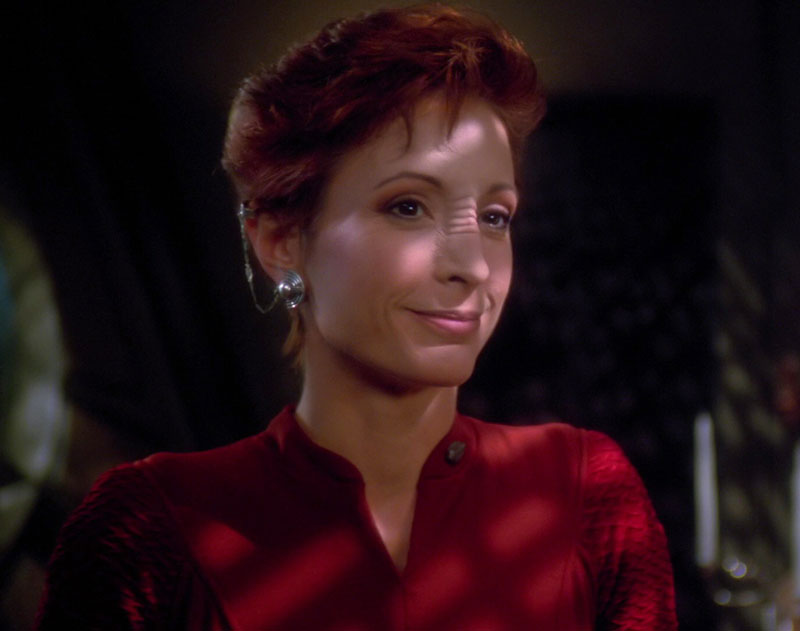
TREKCORE: Can we talk about Kira Nerys a little bit?
NANA VISITOR: Hell, yeah!
TREKCORE: You basically had to interview yourself for the book. Revisiting the character, did you think about Kira differently with the themes of this project?
VISITOR: Oh my god, yes. It’s like Kira was my chance to be the full spectrum human that I happened to be that was unacceptable at the time — but I had a chance, because she was an alien. And I took the chance. I probably ran with it a little bit, but because she existed, this stuck person that I was started thinking and behaving like Kira. Kira taught me how to be me. Does that make sense? I had the ability to think the thoughts that I wouldn’t think before, and to take the chances. That character shifted my brain.
TREKCORE: That’s what the character did to a lot of people watching too, it was just that powerful.
VISITOR: I wish I had known that at the time. I always had this feeling at conventions —there were some people who would be very appreciative but for the most part, I always felt like I had to keep my head down and go, “It’s okay.” I just felt like I needed to do it. I had to do it this way, and yet I got a lot of flack for it.
TREKCORE: What do you think changed? When did the tide turn and you start to realize you didn’t have to do that?
VISITOR: It’s like night and day. I know exactly when — once Deep Space Nine was available to watch streaming, and people saw it as a serialized show with a progression. They realized they were watching an arc and not just having this idea, maybe they watched the first episode and went, “Oh, no. I can’t stand this character.”
I remember at a convention, this 15-year-old boy came up to me and said, “I love Kira Nerys… and I have a crush on her.” And I thought “that’s so healthy.” I’m so glad to hear that, and now I meet men with wives and they have children and he goes, “I had such a crush on you, and here’s my Kira.” Saying that she is, you know, powerful..
TREKCORE: That’s wonderful. And there isn’t just one box, one type of way to be.
VISITOR: And if you don’t fit in a box, you create your own and say, “This is me.”
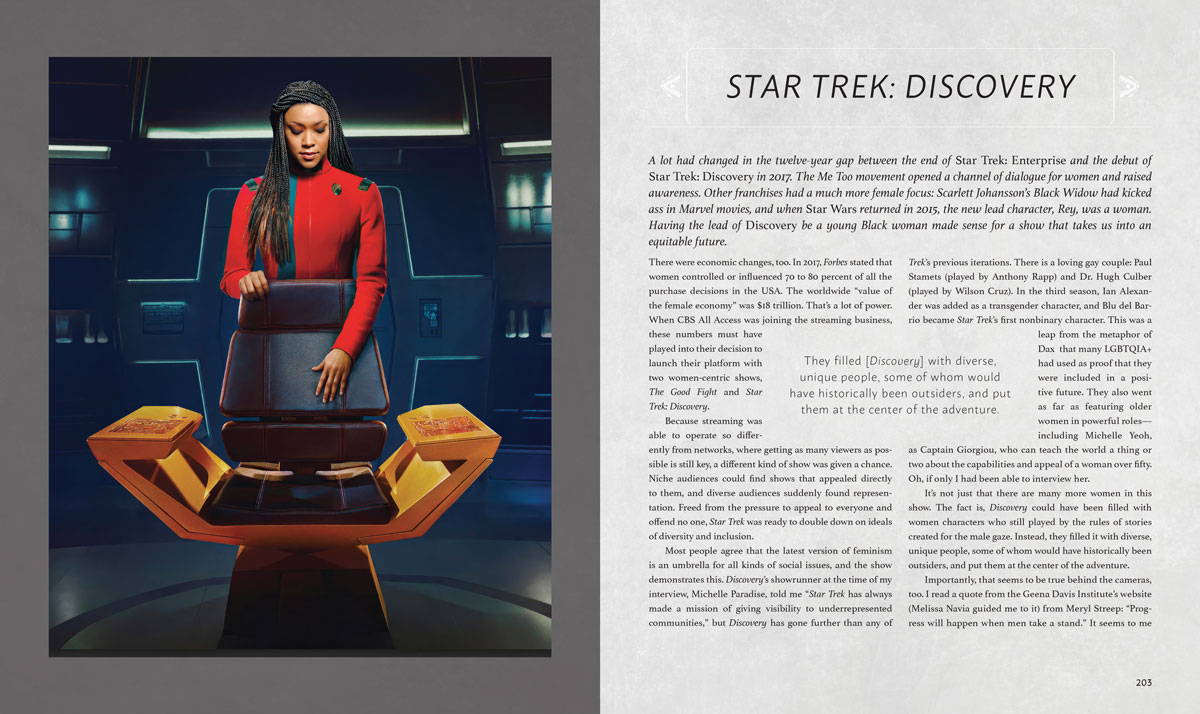
TREKCORE: I feel like that’s the message in this book too — seeing all these different examples of all these different women doing their thing. It’s an important lesson, and I think that’s the promise of Star Trek.
VISITOR: It is. And if supported by men, look, Ira Steven Behr and Peter Allan Fields did so much for my character, gave me so much room. Ben Robinson opened a door and said, “Come on, walk through it. Walk through it. You do it.” It’s huge. That’s the only kind of door opening we need.
TREKCORE: And leaving the door open for more people.
VISITOR: Leave it open for the other women to come through too, all of us.
TREKCORE: I found it really interesting when Roxann Dawson spoke about directing; how she said you have to be perfect, because you’re representing all of the women in the whole world. Like if you mess up, they’re gonna say, “That’s it. Women can’t do this.”
VISITOR: She is an amazing woman and incredibly strong. And to hear how she had to fight to be a director you go, “I understand why she feels that way.” But you can’t bear that weight when you get creative. You can’t bear that. And there’s not a job that isn’t creative that you don’t need all of your brain for. And if much of it is fearful, you’re screwed.
TREKCORE: How do you feel being a mentor for-for so many women like this?
VISITOR: I think that as an elder, that is my joy and my curiosity, and it feels like the connection I want so much. I want to see young women have an easier time. They are, but even more so. I see the stress and I see the worry and there’s so much that is unnecessary, you know? And just having someone who’s been through it before, but also it’s a conversation because a young woman can tell me, “No, no, that’s not what we’re dealing with anymore.” I need to shift my thinking. [laughs] It’s a two-way street.
TREKCORE: Right. It has to be beneficial for both parties and they’re dealing with different challenges than we did, right? I think this book is very instructive in that. I really enjoyed hearing from the younger women on the newer shows.
VISITOR: Me too. But we need to know history, we need to know recent history that women said, “That’s just the way it is,” or, “That’s just the way it was.” We need to keep that in mind, because Voyager to Enterprise, right? We need to keep things moving forward.
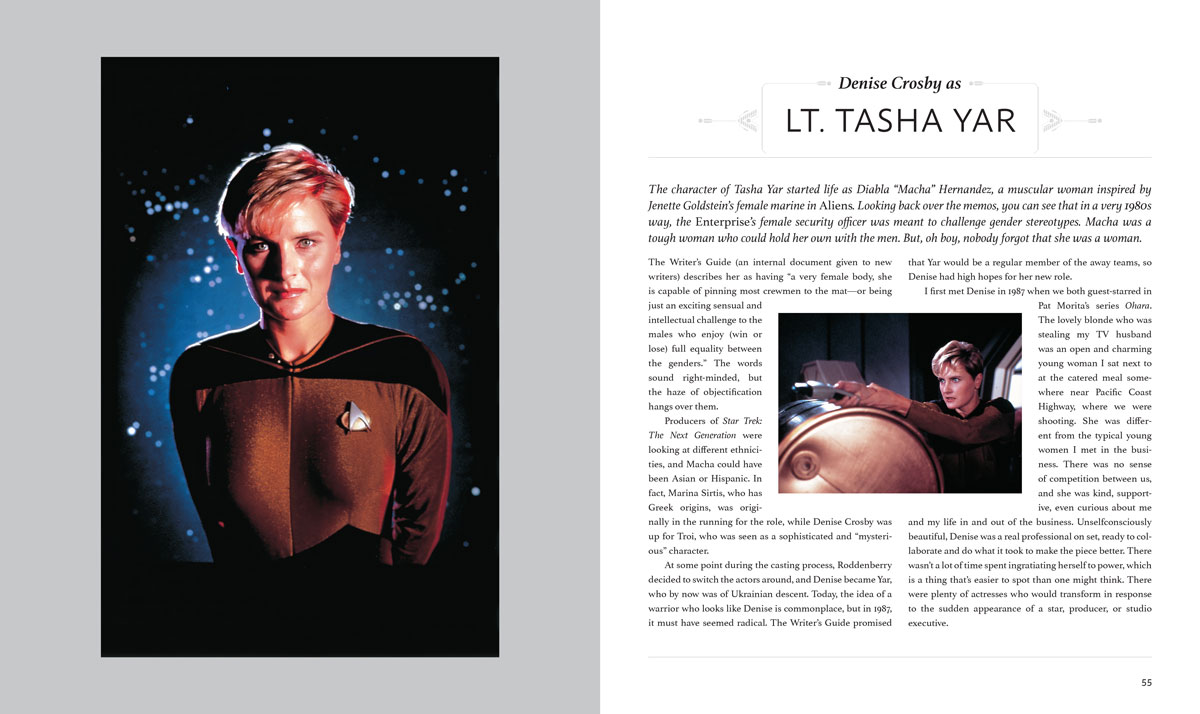
TREKCORE: It’s so interesting, as you mention in the book, that nobody mentioned T’Pol or Hoshi to you as characters that were inspirational to them.
VISITOR: Not that I can recall. However, I understand how important — from Linda’s other interviews — how important it was that there was Asian representation in any way on the show.
TREKCORE: Yes, Hoshi is an important character in that respect. I think the biggest thing you could say about Hoshi is that we didn’t get enough Hoshi.
VISITOR: We didn’t get enough Hoshi. I think it was maybe, in my opinion, too soon to give the woman the terror of being in space. That would read differently now. I think it was too soon. I think a man, we could just see it as a human thing that would happen that they would be terrified, you know. But it was too laden at the time for it to be a woman.
TREKCORE: Yes. And I don’t wanna be too harsh on Enterprise. I’m actually a big fan of Enterprise.
VISITOR: A lot of people are. And here’s the thing, they did have some women writers, didn’t they? They had some women writers. But there’s — and one of them told me this — she basically said, “I can have the most progressive idea for a script, but if the person at the top doesn’t want that, it’s not gonna happen.” So you need to have women and then they need to be given the full spectrum of what they want to do.
TREKCORE: So you watched a lot of Star Trek for this book.
VISITOR: I did.
TREKCORE: And you watched with a real critical eye.
VISITOR: And that’s really important because I had the lenses on my eyes of what was this like for women. So it doesn’t mean that Enterprise, if you’re just watching it, you know, falls down in any way. It just means through my eyes, watching for women specifically for this, I go, “Well, wait a minute. This isn’t great.” So that’s important to remember.
TREKCORE: Did you have any surprise favorites? Any episodes that stood out or characters or shows in particular that stood out for you?
VISITOR: Quite a few. I was shocked how good it all was. But I’ll say the character of Seven of Nine. Talk about unconscious bias. Before I watched it, just from what I saw in posters and stuff, I thought I knew what it was — and I absolutely did not.
TREKCORE: You described her as a Trojan horse in your book.
VISITOR: Yes. That character is a Trojan horse. I found that all very, very powerful. That was a real shock to me. Also Strange New Worlds. I resisted watching it but my gosh, it’s so good. I think it’s so good. And I find that Pike is exactly the kind of leader that I would love to see in most hierarchies.
He has an idea of what he thinks, but he takes everybody’s advice in and it’s not about ego. It’s about what’s best for whatever mission or whatever person he’s talking about. I love that example. I think he’s wonderful. Anson Mount is wonderful in it. And I love that no one looks like each other. And they’re all honored for what and who they are. It’s so refreshing.
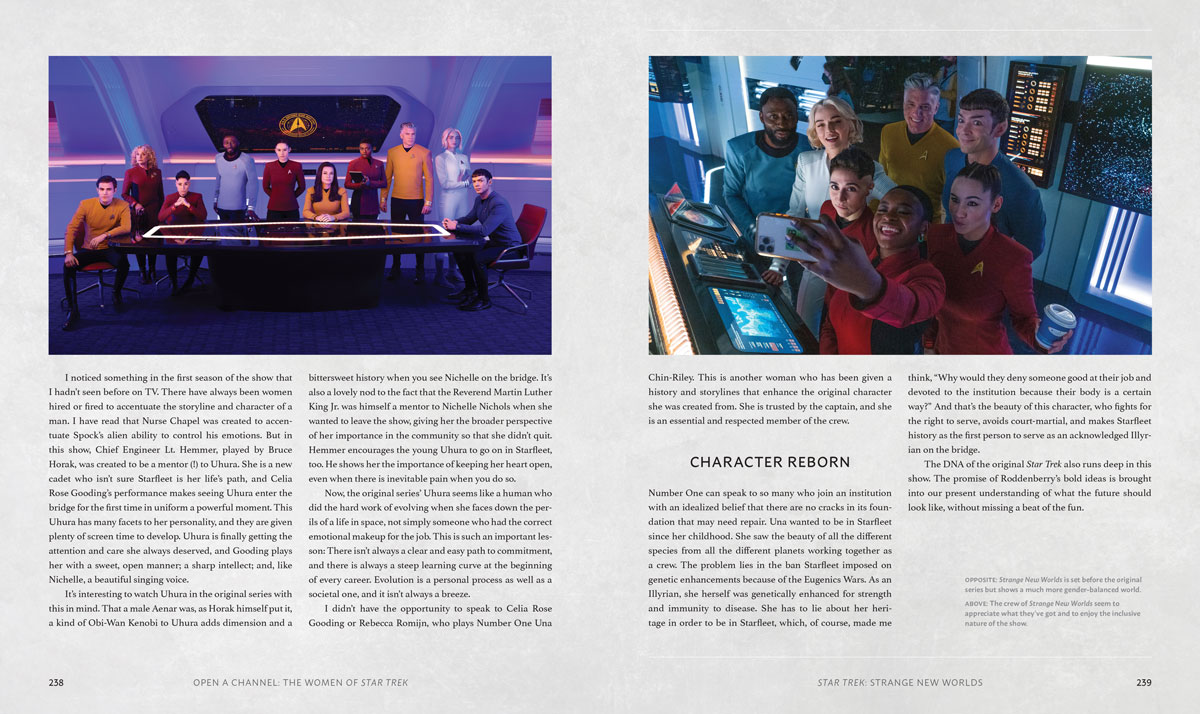
TREKCORE: When you revisited Deep Space Nine, did anything strike you as like, “Oh, I don’t remember that,” or “Oh, this was a good one. I did great in this one,” you know?
VISITOR: Oh yeah. It was a lot that I didn’t remember — and don’t forget, at the time we were filming I didn’t record them and watch them, it was just like everybody else, it was catch-it-if-you-can. I was floored by the writing after so many years of being away from it, floored by the writing and how it stands up and how it’s appropriate to our times right now, 30 years later.
TREKCORE: That’s why Deep Space Nine’s the best.
VISITOR: The writing is incredible. Truly incredible. Ira was another one who was so generous with his time in letting me interview him and his wife — who is a force to be reckoned with, and had so much to do with me not having to hide my pregnancy, which was huge.
TREKCORE: That must have been so important to you.
VISITOR: That was was a big shift because I was sure I was gonna get fired. Because you get pregnant, you could get fired. That changed everything for me to go, “I can have a life and a job.” We’re still not there with everybody. It’s a struggle.
It’s a question I asked everybody. What should Star Trek do with childcare? Let’s talk about it because Star Trek has answers for everything. That’s something that we need a little 1,000 years ahead advice about.
TREKCORE: The way they decided to incorporate your pregnancy in “Body Parts” was just such a delightful sci-fi premise. It wasn’t about hiding your pregnancy, that it was just like, “Let’s come up with this little switcheroo.”
VISITOR: It was brilliant because then they wouldn’t have to deal with me raising a child and being my character. It was brilliant. Really brilliant.
TREKCORE: What was the experience of filming the birth (in “The Begotten”) like?
VISITOR: The only thing I remember really, really specifically is I had already had Django. The child I was carrying was recently born. So, I wasn’t pregnant anymore. I was wearing something to make me look pregnant at that point. Although I gained 60 pounds, so they really didn’t need the padding. I was still well padded.
But I was hormonal and enraged because they had such a young baby and they smeared it with what looked like cream cheese and raspberry jam and the baby was shaking. You know, it’s cold on the set. Shaking. And they have baby wranglers, so the mother’s not allowed to touch the baby when it’s working. And I just was beside myself about that.
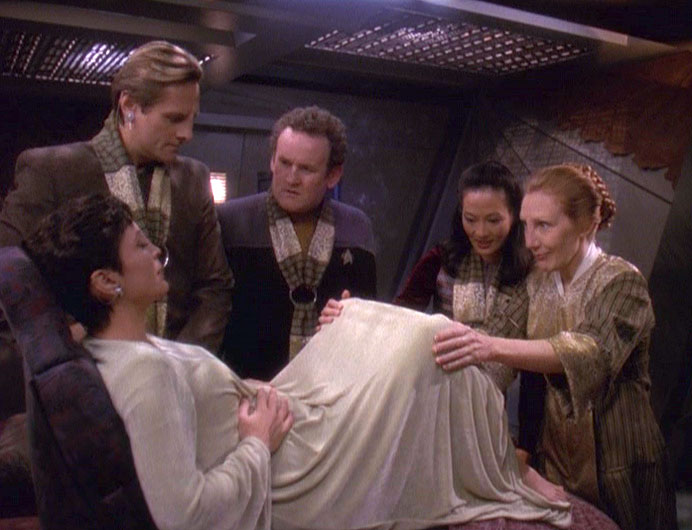
TREKCORE: That’s terrible!
VISITOR: Yeah, it was terrible. It was a terrible experience. I’m going, “Look, just make an animatronic. Just make a doll!”
TREKCORE: I’m gonna look at that episode in a new way! [laughs] Well, thank you, you’ve been so generous with your time. I really appreciate it. This has been such a joy for me.
VISITOR: For me too. And I’m so glad that you enjoyed the book.
![]() Open a Channel: The Women of Star Trek is in stores now.
Open a Channel: The Women of Star Trek is in stores now.
